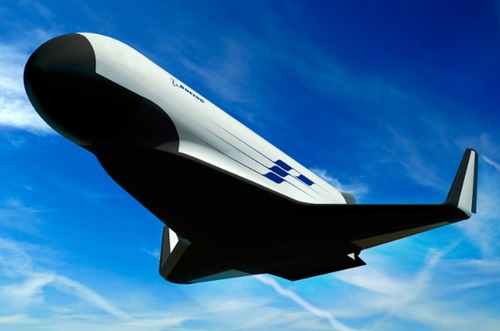
Boeing’s concept for the XS-1 spaceplane, one of three selected by DARPA for Phase 1 studies. (credit: Boeing)
The Defense Advanced Research Projects Agency (DARPA) announced Tuesday it has awarded study contracts to three teams, representing a mix of established and entrepreneurial space companies, to study concepts for a reusable suborbital spaceplane.
DARPA said it awarded contracts to three teams: Boeing, working with Blue Origin; Masten Space Systems, working with XCOR Aerospace; and Northrop Grumman, working with Virgin Galactic. The contracts, for phase one of the Experimental Spaceplane 1 (XS-1) program, cover initial design work on concepts for the vehicle, designed to serve as a reusable lower stage of a low-cost launch system for medium-sized satellites.
“We chose performers who could prudently integrate existing and up-and-coming technologies and operations, while making XS-1 as reliable, easy-to-use and cost-effective as possible,” said DARPA XS-1 program manager Jess Sponable in a DARPA statement announcing the contracts. “We’re eager to see how their initial designs envision making spaceflight commonplace—with all the potential military, civilian and commercial benefits that capability would provide.”
The DARPA statement did not reveal the size of the contracts. However, DARPA has earlier announced, though a Federal Business Opportunities posting, a contract award to Masten valued at just under $3 million. Boeing, in its own press release about the contract, said its contract was valued at $4 million, although it wasn’t clear if that included any award to Blue Origin.
Boeing also released an illustration of its XS-1 concept, a winged vehicle. “Boeing brings a combination of proven experience in developing launch systems and reusable space vehicles, along with unparalleled expertise in the development and fielding of highly operable and cost-effective transportation systems,” said Steve Johnston, director of Boeing’s Phantom Works Advanced Space Exploration division, in the Boeing release.
The goal of the XS-1 program is to develop a vehicle capable of flying ten times in ten days, including at one least one flight to Mach 10. The XS-1, coupled with an expendable upper stage, would be able to launch satellites weighing up to about 2,270 kilograms into low Earth orbit for no more than $5 million a flight. The vehicle could also serve as hypersonics technology testbed. DARPA will select a company in a Phase 2 some time next year to build the XS-1.

Leave a Reply